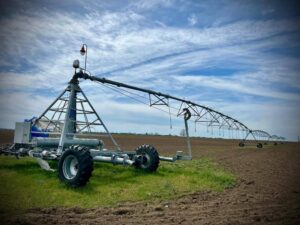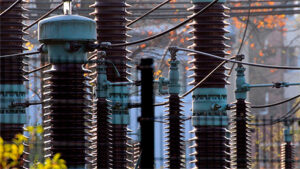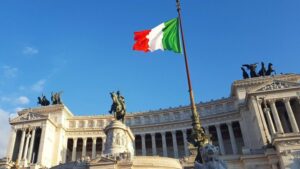
Deputy Prime Minister for Recovery, Minister of Community and Territorial Development Oleksiy Kuleba and Deputy Prime Minister, Minister of Foreign Affairs of Italy Antonio Tajani signed a grant agreement for EUR6 million in non-repayable aid for the reconstruction of two irrigation systems in the Odesa region,
according to the press service of the Ministry of Community and Territorial Development.
“This decision will improve the efficiency of agricultural production in southern Ukraine, stabilize water supply, and reduce resource losses in arid areas,” said Deputy Prime Minister for Recovery and Minister of Community and Territorial Development Oleksiy Kuleba.
The ministry added that the ministers signed a number of other agreements on financing key areas of recovery: agricultural infrastructure, cultural heritage sites, medical facilities, housing programs, and ensuring Ukraine’s access to Italian financial mechanisms.

Imports of transformers, inductors, and chokes to Ukraine in January-June 2025 increased 2.6 times compared to the same period in 2024, reaching $494.2 million, according to statistics from the State Customs Service.
According to the published data, China remains the largest supplier of these products to Ukraine — during this period, $407.5 million worth of these products were imported (82.5% of all imports of these goods), while a year earlier, $103.9 million worth of transformers and chokes were imported from this country (53.7%).
In addition, transformers were imported from Germany ($28.8 million) and Turkey ($15.3 million), while in January-June 2024, imports from Turkey amounted to $38.4 million, and from the Czech Republic – $7.2 million. In particular, in June, imports of this equipment increased 3.6 times compared to the same month last year, and almost doubled compared to May this year, to $103.4 million.
At the same time, Ukraine exported transformers, inductors, and chokes worth $13.7 million in the first half of this year, compared to $8.6 million last year, mainly to Germany, Hungary, and Poland.
According to the State Customs Service, imports of transformers, inductors, and chokes to Ukraine in 2024 more than doubled compared to 2023, reaching $596.11 million. with imports from China increasing 2.5 times to $400.48 million.

The European Bank for Reconstruction and Development (EBRD) has granted a loan of up to EUR50 million to Nova Poshta LLC, part of the Nova Group, to finance part of its capital investment program for 2025-2026.
According to the bank’s press release on Friday, the loan will be multi-currency with the option of drawing funds in hryvnia and euros and will consist of two tranches: the first tranche of EUR35 million will be provided upon signing, and the second tranche of EUR15 million will be reserved by the bank at its sole discretion.
According to the release, Nova Poshta’s development strategy supported by the loan includes improving physical infrastructure, optimizing and expanding the network, modernizing IT systems, improving energy management and restoring human capital, as well as decarbonization and wider access for women.
The total cost of the project is EUR69.1 million, according to the announcement.
The EBRD financing is guaranteed by a first loss guarantee covering 15% of the EBRD loan amount provided by the European Union (EU) under the Ukraine Investment Framework for Municipal Infrastructure and Industrial Resilience (UIF MIIR).
An investment grant of up to EUR1.5 million is also expected to be provided to support decarbonization and human capital restoration programs supported by the TaiwanBusiness-EBRD Technical Cooperation Fund and the Crisis Response Special Fund (CRSF).
According to the release, in 2024, Nova Poshta set a new record by delivering 429 million shipments, 16% more than in 2023, and the significant growth in demand, in turn, created a need for further expansion.
Nova Poshta is the main operating subsidiary of the Nova Group, which is owned by two Ukrainian businessmen, Vyacheslav Klimov and Volodymyr Poperechnyuk. It operates a network of over 39,000 service points and has around 33,000 employees in Ukraine, serving over 11 million customers every month.
The EBRD has been successfully cooperating with Nova Poshta since 2018, financing four of its projects during this time.
According to Nova Poshta’s financial report for the first quarter of 2025, its consolidated net income increased by 20.7% compared to the first quarter of last year, to UAH 14.3332 billion, while net profit decreased by 21.4%, to UAH 567.7 million. The ultimate beneficial owners of the company are Volodymyr Poperechnyuk and Vyacheslav Klimov.

The Ministers of Foreign Affairs of Ukraine and Italy, Andriy Sybiga and Antonio Tajani, signed a Declaration of Intent within the framework of the Tallinn Mechanism on the sidelines of the URC2025 Ukraine Recovery Conference in Rome, the press service of the Ministry of Foreign Affairs of Ukraine reports.
“The document confirms Italy’s continued support in strengthening Ukraine’s civilian cyber resilience and in facilitating the post-war recovery of our country. It also stipulates the intentions of the parties to deepen cooperation in the field of cybersecurity, digital transformation and the implementation of long-term initiatives and projects under the Tallinn Mechanism,” the telegram channel said.
It is noted that for this purpose, Italy has declared the allocation of 1 million euros to finance relevant projects.

Imports of tractors to Ukraine in January-June 2025 amounted to $421.05 million, which is slightly less than in the same period in 2024 ($425 million), according to statistics from the State Customs Service.
According to the published statistics, tractors were mainly imported from the United States (18.9% of total imports of this equipment, or $79.7 million), China (17.5% or $73.8 million) and Germany (17.4% or $73.1 million), while a year ago it was Germany ($68.6 million), the Netherlands ($60.6 million) and China ($55.6 million).
In June of this year, imports of tractors increased by 21% compared to June 2024 to $63.6 million, which is also 3.6% more than the volume of imports in May of this year.
According to statistics, in January-June this year, tractors worth almost $3 million were exported, mainly to Romania (38%), Germany and Zambia.
As reported, imports of tractors to Ukraine in 2024 amounted to almost $784 million, which is 5.6% less than a year earlier, while exports amounted to $5.44 million against $5.74 million.